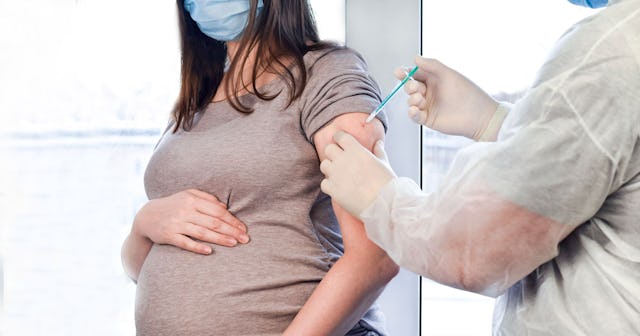Research Shows Pregnant Women Respond Slower To COVID Vaccine

Researchers say pregnant and breastfeeding women take longer to mount an immune response after receiving a COVID vaccine
While researchers have been absolutely clear that pregnant women can and should get vaccinated against COVID-19, new research now shows that people who are pregnant or breastfeeding may take longer to mount a strong immune response after receiving the vaccine, and may temporarily have a weaker response.
The new research, published this month in the journal Science Translational Medicine, shows that pregnant and breastfeeding women may respond more slowly to their first dose of the vaccine, taking longer to develop enough antibodies to give them strong protection against COVID. After the second dose, though, their response looks almost normal. Researchers say this new evidence points to the importance of making sure women who are pregnant or breastfeeding receive their second dose as soon as they’re eligible, and that they be extremely careful to avoid infection in the time between their first shot and their second.
Researchers analyzed the immune responses of 84 pregnant women, 31 breastfeeding women, and 16 non-pregnant women, all in the same age range. All the women were vaccinated with either Pfizer or Moderna vaccines. After the first does, the pregnant and breastfeeding women had fewer antibodies than the non-pregnant women of the same age. The antibodies they did have were less effective at fighting COVID when they were exposed to it. But by two to six week after the second dose, pregnant and breastfeeding women had the same level of antibodies and non-pregnant women.
Researchers believe the different response is because during pregnancy, a woman’s immune system is modified so it doesn’t attack the fetus, which is essentially a foreign entity inside the body. That’s also why pregnant women are more likely to get severely ill or die if they are infected with the COVID-19 virus. Earlier research seemed to point to pregnant women having a slightly weakened immune response after receiving the vaccine, but there wasn’t a lot of data, because pregnant women weren’t included in early vaccine trials due to safety concerns.
The women in the study were given the vaccine at different points in their pregnancies, and researchers say this study should help lay the groundwork for future research that could determine an “ideal” time for a pregnant woman to get vaccinated. For now, though, they say this research should absolutely not deter anyone from getting vaccinated, but is more evidence that pregnant women need to take other measures, like social distancing and masking, to best protect themselves.